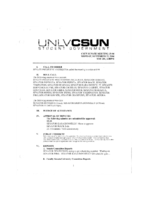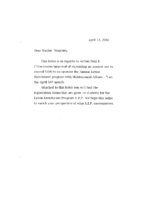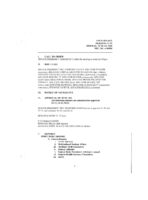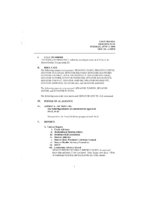Search the Special Collections and Archives Portal
Search Results

Meeting minutes for Consolidated Student Senate, University of Nevada, Las Vegas, November 22, 2004
Date
Archival Collection
Description
Text

Meeting minutes for Consolidated Student Senate, University of Nevada, Las Vegas, August 30, 2004
Date
Archival Collection
Description
Text

Meeting minutes for Consolidated Student Senate, University of Nevada, Las Vegas, April 16, 2001
Date
Archival Collection
Description
Text

Meeting minutes for Consolidated Student Senate, University of Nevada, Las Vegas, June 14, 2004
Date
Archival Collection
Description
Text

Meeting minutes for Consolidated Student Senate, University of Nevada, Las Vegas, June 01, 2004
Date
Archival Collection
Description
Text

Transcript of interview with Melanie Greenberg by Barbara Tabach, June 14, 2016
Date
Archival Collection
Description
When Melanie Greenberg was a young girl in her hometown of Kansas City, Missouri, she thinks it is likely that she crossed paths with her future husband at Hebrew School. However, it would be years later in college when they officially met – and fell in love and married in 1970. By 1976, Missouri was in the rearview mirror and career opportunities for her husband Gene Greenberg would lead them to Las Vegas. With their 18-month-old daughter Sari, they drove into Las Vegas for the first time, down Boulder Highway to Flamingo Road. Gene’s employer had arranged for a room at the Flamingo Hotel. As she explains, there many have been a better route, but it brought them to town and they stayed, raised their family, and became fixtures in the community since that moment. Among their first goals was finding a synagogue. Melanie’s magical touch has been felt in many places within the Las Vegas Jewish community: an active member of Temple Beth Sholom, the Jewish Federation’s Young Leadership and Women’s programs, organizer of Hebrew High, coordinator of L’Dor V’Dor activities for seniors, and Executive Director of Hillel from 1996 – 2003.
Text

Transcript of interview with Mary Shaw by Barbara Tabach, September 2, 2011
Date
Archival Collection
Description
For the first 19 years of her life, Mary Martell Shaw called Central America home. Then thanks to misrouted luggage, she met the love of her life Rollin H. Shaw, a civil engineer, at a time in when his atomic energy career was taking off. In October 1943, they married in Costa Rica and for the next two decades traversed the country: Hawaii to California to Panama—wherever a project required Ronnie's engineering skills. Mary supported her husband every step of the way, with every new location. As a traditional homemaker of the era, she became adept at raising their four kids while packing boxes, enrolling them in school and setting up a warm home wherever they landed. The move to Las Vegas in September 1964, however, left her a bit challenged: there was a shortage of adequate housing, a concern for where to send her two daughters and two sons to school, and the feeling that they wouldn't be here long. Years later, Mary and Ronnie would retire to the city where their roots ran deepest, Las Vegas. With great wit, Mary recalls the long absences demanded by Ronnie's work with the Atomic Energy Commission. She also tells stories of the great fun they and their fellow Nevada Test Site employees had at parties, of her learning to paint with watercolors, and the pride she has of all her children's successes based on their education in Las Vegas.
Text

Transcript of interview with Betsy Fretwell by Claytee White and Stefani Evans, August 30, 2016
Date
Archival Collection
Description
Shortly before the University of Georgia granted Betsy Fretwell Master's degree in public administration in 1991, she applied for a one-year internship with Clark County, Nevada. The County hired her, but Fretwell did not complete her internship. Instead, the County promoted her, hired her full-time, and soon had her lobbying for the County's interests in Carson City. Her insistence on learning all sides of a question and communicating that knowledge to the decision makers was one of the skills that made her so valuable to Clark County administrators. In this interview, Fretwell discusses her South Carolina childhood, her affinity for the University of Georgia Bulldogs, and the path she took to occupy the office of city manager for the City of Las Vegas. She talks about her years at Clark County and a term at the City of Henderson, but she mostly focuses on her sixteen years at the City of Las Vegas, first as assistant city manager under Virginia Valentine and later as city manage
Text

Transcript of interview with Hank Gordon by Claytee D. White and Stefani Evans, October 26, 2016
Date
Archival Collection
Description
As we go about our days, running errands and getting things for our households, we often don’t think too much of the story behind the commercial real estate and retail stores we frequent. Only when those stores aren’t there and the neighborhood demographic changes do we embrace the nostalgia that goes into the story of the neighborhoods where we live and shop. Hank Gordon is the man behind those memories of those shopping centers we frequent not only in the Las Vegas Valley, but in Washington, Oregon, Montana, California and Alaska as well. Gordon was raised in Los Angeles and graduated from USC in 1956, when he went to work for a home builder in the San Fernando Valley selling his houses to make some extra weekend money. It was during this time he fell in love with real estate and had to break the news to his parents that he no longer was going to be a doctor. Feeling the urge of leadership he told his mentor that he didn’t want to sell houses-he wanted to develop homes instead. Shortly after that he bought a subdivision of lots in Van Nuys and started building 7-11 and Goodyear stores in the early 1960s. In this interview, Gordon talks about building his first shopping center in 1967 and moving to the Pacific Northwest. He moved to Las Vegas in 1988, when he bought 23 new national retailers to the Valley. He was responsible for bring Home Depot in 1999 and Costco and Best Buy to some of Las Vegas’s longest-standing shopping centers; Best of the Boulevard on Maryland Parkway and Best of the West on Rainbow Boulevard. He speaks of the changes to the market after the Great Recession, how retailers are having a hard time keeping afloat because of online shopping, and his days on the planning commission for the City of Las Vegas during the 1990s, when Jan Jones was mayor. It is without a doubt that Hank Gordon is one of the best in the business and there isn’t a lot of competition at the top.
Text

Dorothy Eisenberg interview, March 8, 2017: transcript
Date
Archival Collection
Description
Multicultural advancements in Las Vegas cannot be mentioned without speaking on the monumental contributions of Dorothy Eisenberg. From 1971 to 1998, she was involved with over 25 local organizations and committees and had the honor of having an elementary school named after her. Eisenberg’s beginnings start in the midst of the all American melting pot experience though immigration. Her mother came to the United States from Russia at age twelve and her father from Austria at age sixteen to go upholstery school. Upon marriage, they settled down in Philadelphia after the World War II. They raised Dorothy and her siblings to contribute to the community despite the anti-Semitism that was displayed there on a regular basis. Signs that said, “No dogs and Jews allowed” were common place. After her first husband died, leaving her as a single mother of four little girls, she didn’t allow herself to be trampled by her circumstances by enrolling in Temple University to be a teacher at a time when the university had stigma towards older students. Upon her marriage to her second husband, the family moved to Las Vegas where she found a spiritual home for her family at Temple Beth Sholom, where her children went learned to deeply appreciate their Jewish heritage and attended Hebrew school. Having always been involved with politics in Philadelphia, she faced personal discrimination due to her religion when she was searching for organizations to involve her time. She eventually found a home with the League of Women Voters in 1965 and became involved with the Observers Corp and became aware of what was going on with the African American community from community based research and dialogue. She played a key role as president of the organization and faced heat for her involvement in the desegregation of sixth grade centers with the Kelly vs. Guinn decision in 1972 and was involved with the Welfare Rights Movement. She met Ruby Duncan and Jane Fonda, and she even showed up to the march with her daughters. Eisenberg was heavily involved with her namesake school through meetings with principals at least once a year, reading to students in the classroom, and bringing latkes to the school on Hanukkah. She continues the intergenerational legacy of educational involvement set forth by her parents with supporting her children, grandchildren and great grandchildren in the school as well. Dorothy Eisenberg is a true role model for Nevada and a pioneer for equal education in Las Vegas.
Text
